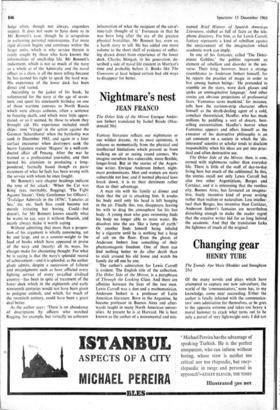Nightmare's nest
JEAN FRANCO
The Other Side of the Mirror Enrique Ander- son Imbert translated by Isabel Reade (Mac- donald 30s) Fantasy literature reflects our nightmares or our wildest dreams. At its most optimistic, it releases us momentarily from the physical and intellectual limitations which prevent us from walking on air or seeing round corners. We imagine ourselves less vulnerable, more flexible, longer-lived. But in the stories of the Argen- tine writer, Enrique Anderson Imbert, night- mare predominates. Men and women are more vulnerable hot less; and if normal physical laws break down, it is to their detriment rather than to their advantage.
A man sits with his family at dinner and finds that the air is attacking him. It erodes his body until only his head is left hanging in the air. Finally this, too, disappears, leaving, his wife to drag the atmosphere for his lost body. A young man who goes swimming finds his body no longer able to resist water. He dissolves into the sea 'like a lump of earth.' Or another finds himself being inhaled by a cigarette until he is nothing but a heap of ash on the floor. Even the ghosts of Anderson Imbert lose- something of their phantasmagoric freedom. One of them can find nothing better to do after death than to stick around his old home and watch his family die off one by one.
The author's admiration for Lewis Carroll is evident. The English title of the collection, The Other Side of the Mirror, is a paraphrase of Through the Looking Glass. And there are affinities between the lives of the two men. Lewis Carroll was a don and a mathematician, Anderson Imbert is a professor of Latin American literature. Born in the Argentine, he became professor in Buenos Aires and after- wards taught in many North American univer- sities. At present he is at Harvard. He is best known as the author of a monumental and mis- named Brief History of Spanish American Literature, stuffed as full of facts as the tele- phone directory. For him, as for Lewis Carroll, fantasy represents a kind of rebellion against the enslavement of the imagination which academic work can imply.
In one of his fantasies; called The Deter- minist Goblins,' the goblins represent an element of rebellion and disorder in the uni- verse. Their king, however, bears a strange resemblance to Anderson Imbert himself, for he rejects the practice of magic in order to live among human beings: 'He pretended to stumble on the stairs, wore dark glasses and spoke an unimaginative language.' And other stories are obvious projections of professorial fears. 'Fantomas saves mankind,' for instance, tells how the cartoon-strip character offers himself as the death-dealing agent of a cold, armchair theoretician, Hauffer, who has made millions by peddling a sort of dreary, best- selling existentialism. Hauffer's horror when Fantomas appears and offers himself as the executer of his destructive philosophy is an apt comment on a society in which the 'dis- interested' scientist or scholar tends to disclaim responsibility when his ideas are put into prac- tical and often destructive use.
The Other Side of the Mirror, then, is coon, cerned with nightmares rather than everyday life. There is little of the stuff of day-to-day living here but much of the subliminal. In this„, the stories recall- not only Lewis Carroll but, also - two other Argentinians, Borges and Cortizar, and it is interesting that the rootless city, Buenos Aires, has favoured an imagina- tive, . freely inventive kind of prose writing rather than realism or naturalism. Less intellec- tual than Borges, less inventive than Cortazar, Anderson Imbert's fantasies are nevertheless disturbing enough to make the reader regret that the creative writer hid for so long behind the academic. And that the translation lacks the lightness of touch of the original.














































 Previous page
Previous page